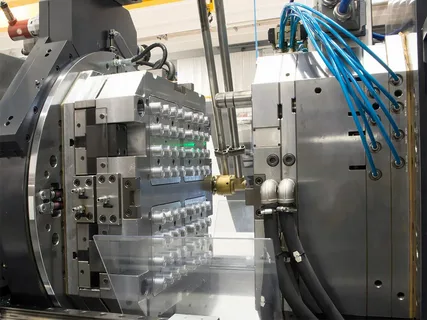What Industries Benefit Most from Quick Turn Injection Molding?

In today's fast-paced manufacturing environment, businesses must find ways to reduce lead times, improve product quality, and remain agile. Quick turn injection molding has become an essential solution, offering rapid prototyping and production for companies that demand efficiency without compromising on precision. This process is particularly valuable for industries that face constantly evolving market demands and tight deadlines. By enabling faster design iterations and small-batch production, quick turn injection molding supports innovation across a range of sectors.
This article explores five industries that greatly benefit from quick turn injection molding: medical devices, consumer electronics, automotive, aerospace, and industrial equipment. Each sector has unique needs and challenges, and quick turn injection molding meets these demands by providing a flexible, cost-effective manufacturing process. Let’s delve into how this rapid manufacturing technique is transforming these industries and why it's becoming a preferred solution for many product development teams.
Medical Device Industry: Rapid Prototyping and Compliance
The medical device industry is under constant pressure to innovate and deliver life-saving products at record speed. Quick turn injection molding allows medical manufacturers to develop prototypes and functional parts in a fraction of the time required by traditional methods. When launching new products such as surgical tools, diagnostic devices, or implant components, speed and precision are essential. With quick turn injection molding, engineers can create high-fidelity prototypes to test designs, ensuring functionality and safety before moving into full-scale production.
Beyond prototyping, this method also plays a vital role in manufacturing low-volume batches for clinical trials or emergency production runs, such as during a pandemic. Materials used in medical-grade quick turn injection molding meet strict biocompatibility standards, making them ideal for applications that require compliance with FDA or ISO regulations. The ability to quickly adapt molds and produce components accelerates the development cycle, helping medical companies stay ahead of the curve and respond swiftly to urgent healthcare needs.
Consumer Electronics: Keeping Up with Fast-Paced Innovation
Consumer electronics is one of the most dynamic industries, where product life cycles are short and innovation drives competitive advantage. From smartphones to wearable tech and smart home devices, brands are constantly releasing upgraded models to meet evolving customer expectations. Quick turn injection molding supports this rapid innovation by enabling the quick production of casings, connectors, and internal plastic components for testing and early market release. This process helps reduce time-to-market and allows companies to capitalize on emerging trends.
In addition to speed, the precision of quick turn injection molding ensures that even the smallest parts—such as clips, buttons, and housing covers—are produced with tight tolerances and excellent surface finish. These qualities are vital in an industry where aesthetic appeal and flawless performance can make or break a product. Whether it’s for prototyping, pre-production, or bridging the gap to mass manufacturing, quick turn injection molding offers the flexibility and responsiveness needed by today’s consumer electronics giants.
Automotive Industry: Streamlining Design Validation and Custom Parts
Automotive manufacturing has traditionally relied on high-volume production, but there’s a growing demand for short-run and custom parts—especially in the age of electric vehicles and smart technologies. Quick turn injection molding fits perfectly into this shifting paradigm, offering automotive companies a way to develop, test, and validate new components at unprecedented speed. Engineers use this method to create prototypes for interior panels, air vents, lighting housings, and other essential elements before investing in expensive production tooling.
Furthermore, the ability to produce limited quantities quickly supports the manufacturing of custom or low-volume parts, such as those used in motorsports, aftermarket accessories, and specialty vehicle production. In an industry that values both performance and safety, quick turn injection molding ensures each component meets exacting standards without long lead times. As the automotive sector embraces digital design and agile development, this method becomes an indispensable tool for rapid innovation and cost-effective manufacturing.
Aerospace and Defense: Precision, Durability, and Compliance
The aerospace and defense sectors operate under some of the most stringent quality and safety standards in the world. Components must not only perform flawlessly but also withstand extreme conditions and meet rigorous compliance requirements. Quick turn injection molding allows aerospace manufacturers to rapidly develop and test high-performance plastic parts such as cable connectors, housings, and interior components. This agility is essential during early design phases and when fulfilling urgent mission-critical requirements.
Quick turn injection molding is particularly valuable in producing lightweight parts that contribute to fuel efficiency and reduced emissions. With material options such as high-temperature thermoplastics and glass-filled composites, manufacturers can replicate the mechanical properties required in flight-ready components. Additionally, defense contractors benefit from the fast lead times when producing parts for field-deployable equipment or limited-edition prototypes. The precision and material versatility of quick turn injection molding make it a strategic asset in industries where failure is not an option.
Industrial Equipment and Robotics: Flexible Manufacturing for Evolving Needs
In the industrial equipment and robotics sectors, constant iteration and custom solutions are the norm. Quick turn injection molding enables manufacturers in this space to create highly specific parts such as brackets, gear housings, covers, and sensor mounts with rapid turnaround times. This flexibility is vital when adapting machines for new applications or optimizing performance in fast-evolving environments like warehouses and manufacturing plants. It allows engineers to prototype and test improvements in real-world settings before committing to mass production.
The ability to produce complex geometries and maintain dimensional accuracy also benefits the robotics industry, where parts must seamlessly integrate with motors, actuators, and electronic systems. Quick turn injection molding reduces the downtime typically associated with tooling changes and long production runs, allowing for just-in-time manufacturing and faster deployment of automated solutions. Whether producing parts for industrial automation systems or custom robotics, this method empowers innovation without sacrificing time or quality.
Conclusion
Quick turn injection molding has emerged as a powerful enabler of innovation across multiple industries. From healthcare to aerospace, its ability to rapidly produce accurate and durable parts transforms how companies approach product development and time-to-market. As industries continue to face evolving challenges, including supply chain disruptions and shifting consumer demands, the need for agile, responsive manufacturing will only grow stronger. Quick turn injection molding provides that agility while maintaining high standards of quality and consistency.







